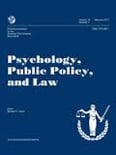 Psychology has contributed to the knowledge base and available assessment and intervention methods in the three following areas of child protection: (a) interviewing children to assess child maltreatment, (b) the well-being of children involved with the child protection system, and (c) evidence-based practices to ameliorate the effects of child maltreatment among children involved with the child protection system. Despite the psychological research and work that has been conducted in each area, however, the effect on usual child protection practice has been limited. This is the bottom line of a recently published article in Psychology, Public Policy, and Law. Below is a summary of the research and findings as well as a translation of this research into practice.
Psychology has contributed to the knowledge base and available assessment and intervention methods in the three following areas of child protection: (a) interviewing children to assess child maltreatment, (b) the well-being of children involved with the child protection system, and (c) evidence-based practices to ameliorate the effects of child maltreatment among children involved with the child protection system. Despite the psychological research and work that has been conducted in each area, however, the effect on usual child protection practice has been limited. This is the bottom line of a recently published article in Psychology, Public Policy, and Law. Below is a summary of the research and findings as well as a translation of this research into practice.

Featured Article | Psychology, Public Policy, and Law | 2017, Vol. 23, No. 4, 503-518
Psychology and Child Protection: Promoting Widespread Improvement in Practice
Authors
Theodore P. Cross, University of Illinois at Urbana-Champaign
Irit Hershkowtiz, University of Haifa
Abstract
The contribution of psychology to knowledge on child protection is substantial. This article reviews this contribution and suggests opportunities for psychology to contribute more, choosing 3 selected areas: (a) interviewing children to assess child maltreatment, (b) the well-being of children involved with the child protection system, and (c) evidence-based practices to ameliorate the effects of child maltreatment among children involved with the child protection system. Across these areas, psychology has contributed both to the knowledge base and to available assessment and intervention methods. However, in each area, the effect on usual child protection practice has been limited. Psychology has an opportunity to broaden its contribution through research and systems intervention aimed at extending gains in these areas throughout the child protection field.
Keywords
child abuse and neglect, child maltreatment, psychology, child protection, child welfare
Summary of the Research
“Psychology’s influence in child protection is too widespread to fully review in a single article, and our primary interest is not in ‘covering the bases,’ but in suggesting psychology’s potential to play a larger role in preventing child maltreatment and ameliorating its effects. We have selected for review three areas of knowledge development: (a) interviewing children to assess child maltreatment, (b) the well-being of children involved with child protection, and (c) evidence-based practices used to respond to child victims and their families” (p.504).
“Research on children’s communication skills has stimulated the creation of instructions to help children cope with the challenges of a forensic interview. Young children are unlikely to monitor their knowledge and comprehension of questions and rarely admit lack of knowledge and understanding or recognize that it is acceptable. Children may fail to ask for clarification or to correct interviewers who introduce inaccurate information…providing children with ground rules and clear expectations can alleviate some of the challenges of forensic interviews. Instructions to report only from direct experience, to tell what really happened…and to correct interviewers’ errors show positive effects…” (p.504).
“…Aids and props are widely used in child interviews, and can be successfully combined with open-ended prompting to assist children in providing more detailed accounts of their experiences. However, interview aids vary in their effectiveness, and they should be used cautiously to avoid adverse effects on the accuracy of the information, especially among young children. Research supports having children first construct narratives about a neutral event. This models what they will be asked to do with open-ended questions about maltreatment and also teaches them to provide specific rather than generic information about an episode…With this practice, children also report more information following open-ended prompts” (p.504).
“…Establishing rapport with children to gain their trust before exploring the possibility of abuse is widely recognized as best practice. Research has found that open-ended prompts for personal information at the onset of the interview help establish rapport. Socioemotional support is especially important when child victims are reluctant to disclose abuse…The intervals between multiple sessions may provide opportunities for adults to influence the child’s response, particularly when parental abuse is suspected…A recent meta-analysis of interview outcomes found an association between interviewers’ support and measures of eyewitness competence-that is, reduced acquiescence, increased accuracy and resistance to false suggestions-with rare evidence of adverse effects…The National Institute of Child Health and Human Development (NICHD) Investigative Interview Protocol has been especially well researched, and has shown positive effects on interviewers’ techniques, children’s responses, and case outcomes.” (p.505).
“…In recent decades, the child protection system has increasingly recognized that it has the responsibility to attend to the well-being of the children it serves…Children involved in CPS need this attention because their well-being is threatened not only by maltreatment but also by its correlates, such as poverty, parental substance abuse and mental health problems, and domestic violence…The increased attention to well-being in CPS and the implementation of well-being measurement systems are promising, but many obstacles make it difficult to respond adequately to the well-being challenges of children involved in child protection. Well-being measurement systems may be ineffective. Some caseworkers lack computer skills, and workload, turnover, and other workforce issues make it difficult for CPS caseworkers and supervisors to have the time and attention for data…” (p.506-508).
“Child protection systems are increasingly seeking to implement EBP (Evidence-Based Practice)…One component of EBP is the use of Evidence Supported Interventions (ESIs), which are specific interventions with a substantial research base supporting their use…Many ESIs were developed by using psychological theory to understand the cognitive and behavior underlying child maltreatment, and applying psychoeducational and psychotherapeutic intervention methods first developed with other populations to children and families affected by child maltreatment….ESIs such as parent-child interaction therapy, the Positive Parenting Program, and the Incredible Years intervention were originally developed to treat child conduct problems but have been applied successfully to families involved in the child protection system because of physical abuse” (p.509-510).
Translating Research into Practice
“…Child protection agencies must provide opportunities for intensive, spaced training of child forensic interviewing, despite its costs and demands on interviewers. They must also structure interviewers’ workload to allow for time for preinterview planning and postinterview review. Future research also needs to study promising modes of training that are less costly, such as computer- assisted training, train-the-trainer programs, and peer supervision and feedback. Research should assess the amount of training needed to ensure that favorable practices are established and maintained. Studies are needed on resources and policies that support training and feedback for forensic interviewers and the impact of this support on interview quality” (p.506).
“…Psychologists should assist child protection agencies in developing and evaluating methods for improving feedback using child well-being data and assessing its impact…Mental health and early intervention programs could develop stronger partnerships with CPS agencies to assist in screening children because caseworkers lack training in mental health and developmental deficits. EI professionals could receive continuing education, training, and supervision to deal with the extra demands of relationships with families involved in CPS…Psychology training programs could enhance the training they provide on maltreatment and child protection; most programs provide limited relevant instruction… ” (p.508-509).
“…Psychologists and other practitioners who contract with CPS (within private agencies or as independent practitioners could become trained in relevant ESIs and develop the resources to implement them and could use this capability to market their services to CPS. Psychologists and other practitioners in management or advisory roles in CPS could identify which ESIs are most needed in their catchment area and advocate for awarding service contracts…could add instruction in choosing EBPS to CPS caseworker training…More research is needed on the dissemination of ESIs and EBP in child protection. Theory and methods used to study dissemination EBP in mental health services can be applied to research on EBP in child protection” (p.510-511).
“Psychologists who want to contribute to child protection can find several ways to collaborate with child protection agencies. For example, they can partner with agencies to seek state and national funding to enhance interviewer training, test well-being measurement systems, or test ESIs and other promising interventions. They could respond to solicitations from child protection agencies for program evaluations. They could develop or join service agencies that contract with CPS agencies and influence these service agencies to develop best practice” (p.511).
Other Interesting Tidbits for Researchers and Clinicians
“More advocacy is needed to expand the amount and flexibility of funding for early intervention, mental health services, and other interventions for children and families involved in CPS. For example, innovative methods exist for accessing Medicaid dollars for mental health care for children involved in with CPS, but only a minority of states use these methods” (p.509).
“Several trends in child protection favor a closer relationship with psychology. State and local CPS agencies in the United States face greater Federal and state demand to track well-being, implement EBP, and measure outcomes. Many well-being and outcome measures and interventions relevant for child protection have their roots in psychology, and CPS is likely to seek psychologists’ expertise in implementing these methods” (p.511).
Join the Discussion
As always, please join the discussion below if you have thoughts or comments to add!






















